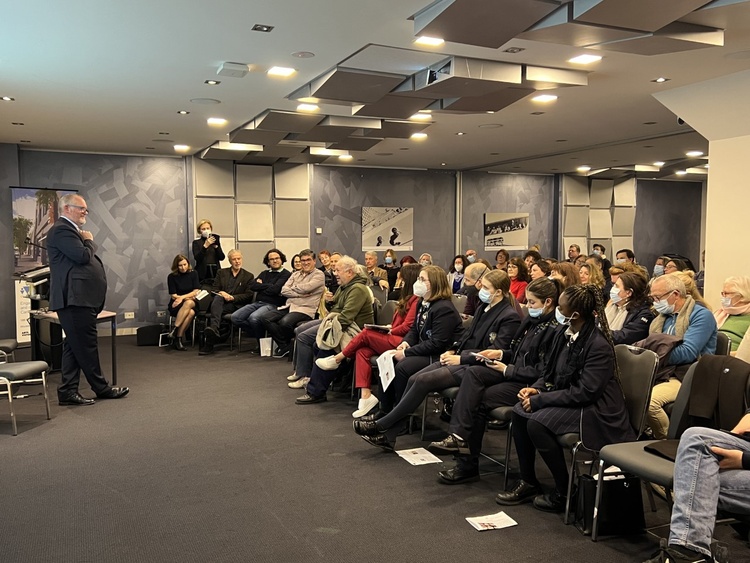Thousands line the pavement, all smartly dressed in shirts and hats, long skirts and elegant bags on their shoulders. There’s a sense of excitement in the air. This is a rare experience. Hands are shaken, hugs exchanged. Neighbours, friends, ‘countrymen’ and familiar faces all meet.
For the millions of migrants who came to Australia in the second half of the last century, anything that came from the motherland seemed absolutely priceless: from delicacies imported at outrageous prices to old newspapers borrowed from friends. Films in Italian, especially, soon became a source of even greater pleasure.
Then, with dozens of local cinemas popping up, thousands of new Italo-Australians found themselves once again admiring the aspects of their childhoods that they had never forgotten, listening to their mother tongue straight from the big screen. Hours spent in a cinema soon turned into a moving, exciting experience, regardless of the quality of the film on screen.
An illustrious panel of filmmakers, academics and devotees of Italian culture recently launched an exciting project: 'The Italian Cinemas in Melbourne - From Post War Migration to The Movie Show'. The initiative provides a comprehensive overview of the cinemas in Victoria's capital that contributed to the reception and distribution of Italian-language films from the period spanning post-World War II mass-migration to the late 1970s.
The community flocked to Co.As.It. in Carlton on August 16 to swap memories over a glass of wine, reminiscing about this shared cinematic heritage that has played an essential role in the lives of so many. Indeed, Italian-language cinemas have been an important means of preserving ties with one's culture, providing significant social and recreational opportunities and reinforcing multiculturalism.
“It was a project that came about somewhat by chance, when we were talking about cinema and history," said Elisabetta Ferrari, a lecturer at the University of Melbourne in the Italian Studies department and project officer at the Australasian Centre for Italian Studies (ACIS).
"We wanted to share our memories with a wider audience, so the idea soon turned into a research project.”
The group of contributors comprises Santo Cilauro – producer, comedian, screenwriter and creator of international hits such as The Castle and The Dish –, playwright and director Mark Nicholls, as well as lecturer in film at the University of Melbourne and Sydney University Susanna Scarparo. The project was also made possible thanks to funding received from ACIS. The Zeccola family, represented by Carlo and Giovanni, will also contribute to the project by providing an impressive collection of historic film posters.
For Santo Cilauro, “Italians are the best at sharing love, food and stories” and that is why he decided to contribute to the project, attracted by the magic of personal stories, which are malleable and never exact.
"I grew up in Collingwood in the 1970s and I liked seeking refuge in a small Italian cinema, Cinema Italia, where I saw some really bad films, but timeless classics: films starring Franco Franchi and Ciccio Ingrassia, and some bad movies about Hercules,” he laughs.
“But it was nice to sit and laugh together with hundreds of other people, to listen to the room come alive,” Cilauro recounted.
“When the owners of the cinema decided to close the business for good, my father, who’s a lawyer, was overseas. Because I was studying law at the time, I found myself overseeing its sale.”
“Those extraordinary people let me take a film poster of my choosing; there were some exceptional posters, even Fellini's I vitelloni, but I chose the most beautiful film I had seen in that cinema: the 1970 World Cup semi-final between Italy and West Germany in Mexico City.”
From a small screening room in Muro Lucano, a small village in Basilicata, to the first big cinemas in Melbourne - The Metropolitan in Brunswick and The Roma on Bourke Street - the Zeccola family has always witnessed the passion of Italo-Australians for the seventh art, ever since the first decades after World War II.
Today, Carlo Zeccola is able to trace the great history of Melbourne cinephiles “through the collection of wonderful posters kept by his father Vincenzo,” while Giovanni Zeccola, who worked at The Metropolitan at a very young age, vividly remembers the happy experience of going to the cinema on a Saturday night, when “the men dressed smartly and the women with perfect hairdos.”
Italians were looking for a couple of hours of light-heartedness, away from the drudgery of everyday life, and they happily lost themselves in the images of the comedies of the great Totò, classic historical-religious films like Ben Hur and The Ten Commandments and Hollywood movies like Jaws, Gone with the Wind and Rocky. Popular music concerts, too, like those of Al Bano and Romina, “whose tickets cost eight dollars and could be bought at Mondo Music, Borsari Emporium and Taormina Generi Alimentari.”
Speaking to the large audience in the auditorium, Mark Nicholls, also curator of the Italian Cinema Forum at Co.As.It., said he was thrilled to soon be able to discover a past that in some way also belongs to him, having grown up in Moonee Ponds, surrounded by first-generation Italians.
"At The Savoy cinema, for example, a handful of the so-called ‘continental films’ were shown between 1929 and 1968 for a very limited time; therefore, the existence of Italian cinemas was really essential.”
Numerous testimonies followed the project's inaugural event at Co.As.It. for all present, “going to the cinema provided a moment of great excitement”, from those who preferred a romantic comedy to those who preferred a De Sica or Fellini work.
Anyone interested in sharing their memories of Italian cinemas in Melbourne can write directly to the research group at the dedicated email address.












